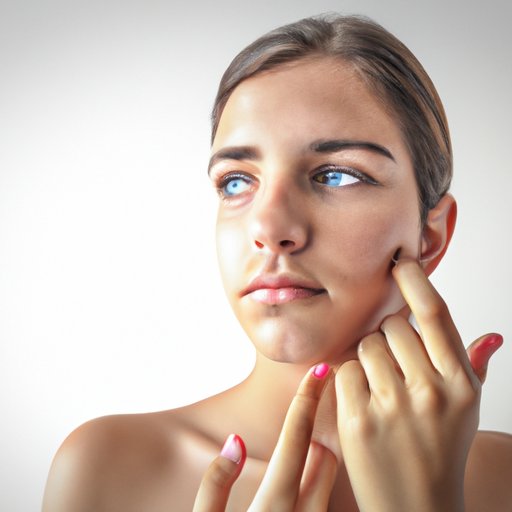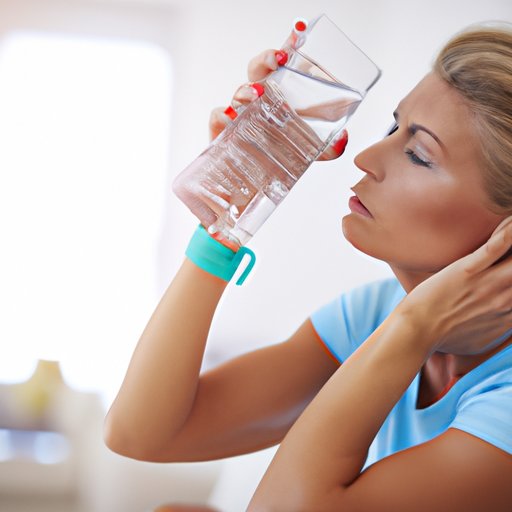Introduction
Dehydration is a condition in which the body does not have enough water to function properly. It can occur when the body loses more fluid than it takes in. Staying hydrated is essential for overall health and well-being, as it helps regulate body temperature, aids in digestion, and helps the body absorb nutrients. It is important to be aware of the signs of dehydration so that you can take action to prevent it.

Identifying the Symptoms of Dehydration
The most common symptoms of dehydration include:
- Headaches
- Fatigue
- Dry mouth
- Dark-colored urine
- Low blood pressure
If you experience any of these symptoms, it is important to take action to rehydrate your body. In addition to these symptoms, there are other ways to determine if you are dehydrated.
Check Your Urine Color and Smell
One way to tell if you are dehydrated is to check the color and smell of your urine. When you are adequately hydrated, your urine should be a light yellow or clear color. According to the National Academy of Medicine, “urine that is darker than usual or has a strong odor is an indication of dehydration”.1 If your urine is dark yellow or has a strong odor, it is a sign that you need to drink more fluids.
Monitor Your Thirst Levels
Another way to tell if you are dehydrated is to monitor your thirst levels. Feeling thirsty is your body’s natural response to dehydration. If you find yourself feeling thirsty more often than usual, it is a sign that you need to drink more fluids. Additionally, if your mouth feels dry or sticky, this is another indication that you are dehydrated.
To help monitor your thirst levels, try drinking a glass of water before meals and snacks. You can also set reminders on your phone or computer to remind you to drink water throughout the day. Additionally, carrying a reusable water bottle with you can help ensure that you are staying hydrated.

Pay Attention to Your Skin
Your skin can also be a good indicator of dehydration. When you are dehydrated, your skin may look dry or feel tight. Your skin may also lack its usual elasticity, making it difficult to pinch. Additionally, wrinkles may appear on your skin when you are dehydrated.
It is important to note that these skin indicators can vary from person to person. Pay attention to how your skin usually looks and feels when you are properly hydrated, and compare it to how it looks and feels when you are dehydrated. This will help you identify the signs of dehydration more easily.
Consider Other Factors That May Contribute to Dehydration
In addition to the above signs and symptoms, there are other factors that can contribute to dehydration. For example, being exposed to high temperatures or high humidity can cause you to sweat and lose fluids more quickly. Additionally, engaging in physical activity or strenuous exercise can cause you to lose fluids faster. Illness and certain medications can also cause dehydration.
Track Your Hydration Habits
Tracking your hydration habits can be a useful tool for monitoring your fluid intake and preventing dehydration. Keeping a log of how much water you drink each day can help you stay on top of your hydration levels. Try setting a daily goal for yourself and tracking your progress throughout the week. Additionally, tracking your hydration habits can help you identify any patterns or areas where you may need to improve.

Consult a Medical Professional if Necessary
If you experience any of the symptoms of dehydration or are concerned about your hydration levels, it is important to consult a medical professional. A doctor can provide advice on how to stay hydrated and may suggest additional treatments if necessary. Some questions to ask a doctor include:
- What are the best ways to stay hydrated?
- Are there any supplements I should take to stay hydrated?
- Are there any foods I should avoid to prevent dehydration?
Conclusion
Dehydration is a serious condition that can have negative impacts on your health and well-being. Being aware of the signs and symptoms of dehydration can help you take action to prevent it. Check your urine color and smell, monitor your thirst levels, and pay attention to your skin for further indications. Consider other factors such as heat, exercise, illness, and medications that may contribute to dehydration. Finally, track your hydration habits and consult a medical professional if necessary.
By recognizing the signs of dehydration and taking action to prevent it, you can ensure that your body is getting the fluids it needs to stay healthy. Taking the time to learn how to tell if you are dehydrated can help you stay hydrated and maintain your overall health.
(Note: Is this article not meeting your expectations? Do you have knowledge or insights to share? Unlock new opportunities and expand your reach by joining our authors team. Click Registration to join us and share your expertise with our readers.)
